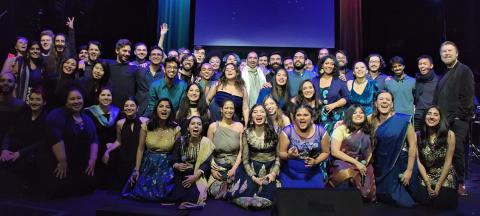Berklee India Exchange Community Reacts to Gully Boy

The Berklee Indian Ensemble onstage following their December 2018 show at the Berklee Performance Center
Image by John Caruso
The Hindi-language film Gully Boy has become an international smash hit since its theatrical release earlier this year. The film tells the story of Murad, an aspiring rapper from the slums of Mumbai pursuing his musical ambitions in the city’s underground hip-hop scene. It has earned widespread acclaim from critics and audiences worldwide—including members of the Berklee India Exchange community, who were quick to notice that the school played a key role in the film’s plot. One of Murad’s chief collaborators, Sky, is a Berklee student who approaches Murad about making a song together, and the song they produce becomes an internet success.
Below, three members of the Berklee India Exchange community share their reactions to the film’s message and Berklee’s surprise cameo.
On What Makes the Film so Successful
Annette Philip, Berklee India Exchange artistic director: “[The film] really brings to life the vibrant Indian hip-hop and underground music scene in the country, specifically in Mumbai.”
Amira Gill, current student and member of the Berklee Indian Ensemble since 2016: “The music and the rap of this movie were so epic! Mic-drop moments spread across the film. They also didn’t use the same music director for the entire film. They made it a collaborative venture.”
Lydia Renold, Berklee India Exchange assistant: “Gully Boy did an incredibly good job of presenting a possible, and very realistic, scenario. It was light enough to be considered entertainment and yet honored many different serious issues and truths about society.”
On Their Key Takeaways
Philip: "The story is really amazingly woven, with intricate interpersonal relationships, character development, and exceedingly well-shot scenes. It’s raw, edgy, real, and accessible, while surprising you at the same time. My only complaint is that the English subtitles (while pretty good) definitely don’t match the eloquence, sophistication, and impact of the original delivery in Hindi.”
Gill: “Despite not being in the best circumstances, [Murad] doesn’t think so much about ‘what the audience wants to hear’—he’s writing his truth down and that holds weight. The intention of his writing was never to write something that would catch the eye of a large audience or to make his work ‘more relatable.’ Sure, he wanted to be known, but he wrote his experience, he wrote the truth of his circumstances, the truth of who he is and what he’s going through. What comes later—the admiration, the relatability—is all a byproduct. His craft always took precedence…The movie showed the process of his artistry. How he was not confident at first and after practice, after critique, after guidance—he reached somewhere. They showed all of that instead of modeling him as someone who was ready from the get-go, which is never the case. It’s a process for every single person."
Renold: “It was a very valuable reminder of how precious the privilege to get to live and work in music is, and that it’s not something to be taken for granted. I come from a family of musicians and have been surrounded by the concept of music education, Berklee, and a professional life in the arts all of my life. As such, it’s always been particularly easy for me to forget how much resistance many people face and how much guts and energy it takes to push forward. Gully Boy did an especially good job at telling that tale.”
On Berklee’s Moment on the Big Screen
Philip: "The entire Berklee Indian Ensemble went to see the film together the week it was released, and we were delighted that Berklee President Roger Brown and Linda Mason, as well as some of our Indian colleagues from Harvard, also joined us that evening. When we were in the movie theater, everyone in the hall whooped when they heard Berklee’s name.”
Gill: “The whole crowd exploded with loud claps and hooting. It was a very sweet and pride-filled moment.”
Renold: “I’m always proud when Berklee is presented to ‘the outside’ and I can think to myself that I am a part of that community and another representative in the world. I think it was especially powerful because we went as a Berklee group and all of us share that identity."